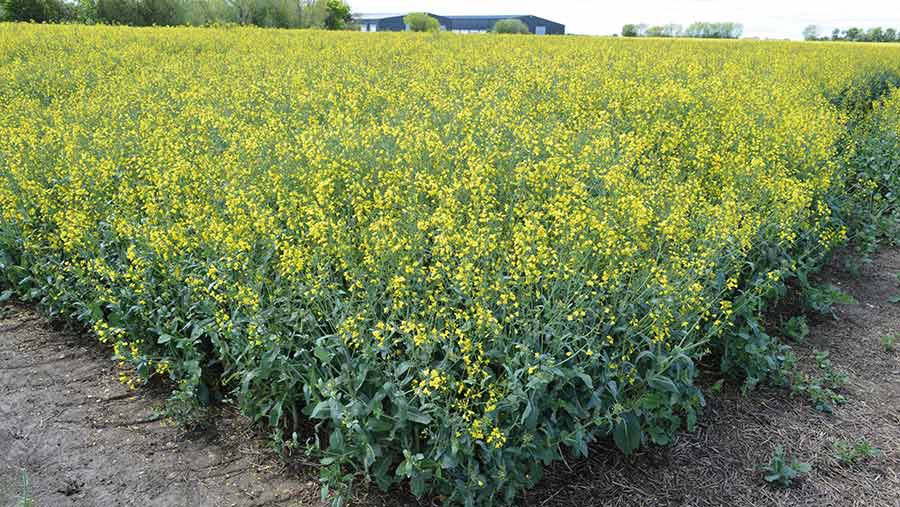How grower adds flexibility with disease-tolerant OSR
 Oilseed rape variety PT303 © MAG/David Jones
Oilseed rape variety PT303 © MAG/David Jones Changing weather patterns and the opportunity to reduce fungicide spray inputs were behind Lincolnshire grower Nick Wright’s decision to grow the sclerotinia-tolerant winter oilseed rape variety PT303.
Having once experienced the devastation that sclerotinia infection can cause in an oilseed rape crop, Mr Wright is keen to keep crops free of the stem disease, but he is also aware of the crop damage that flowering sprays can cause.
See also: Lincs grower adds flexibility by growing disease tolerant oilseed rape
“The other difficulty with sclerotinia decisions is that the fungicides are protectant and have to be on ahead of infection taking place.
“Nine years out of 10 it then turns out that you didn’t need them,” he says.
Second spray
In some years, a prolonged flowering period can also mean that a second spray is required to maintain protection – adding to the crop’s growing costs at a time when all expenditure is being scrutinised and has to be justified.
“Against this background, the weather has become less predictable.
“The season can have quite an effect on the disease, so it means the stakes are getting higher,” he adds.
The recommendation of PT303 in 2021, with its in-built genetic tolerance to the disease, offered some much-needed flexibility with sclerotinia control and has allowed him to deviate from his standard farm practice of two flowering sprays.
“Last year – which was the second time I had grown the variety – I was brave enough to leave a 24m untreated strip and compare it with sprayed areas.
“At harvest, it gave a slightly higher yield than the rest of the field, which was probably due to the fact that I hadn’t run through it with the sprayer,” Mr Wright says.
Oilseed rape yields at Lowfields Farm, near Lincoln, have remained consistent at about 4t/ha, with the crop being grown once every six years in a rotation that includes cereals and spring beans.
“Despite some unwelcome pest issues, it is still doing well and remains the best break crop choice here.
“Like many others, we had an exceptional harvest in 2022. The warm, sunny conditions really suited the crop,” he says.
Hybrid switch
Mr Wright switched to hybrid rape varieties 15 years ago for their extra vigour and resilience and has been pleased with the performance of PT303.
“It’s quick to get going in the spring, which helps if pigeons are around or there has been some larvae damage, and it gives us more scope to reduce inputs,” he says.
As well as its sclerotinia tolerance, the Corteva-bred variety also offers turnip yellows virus resistance, which helps to maintain its yield potential in mild autumns.
It has a 7 resistance rating for light leaf spot and a 6 for stem canker, along with an 8 for resistance to lodging on a 1-9 scale where a high figure indicates the characteristic to a high degree.
Most of the oilseed rape Mr Wright has in the ground this year is PT303, with one block of Duke from DSV.
It was drilled in the third week of August, established well thanks to a post-rolling rain shower, and was knee-high by Christmas.
Having applied Astrokerb (propyzamide + aminopyralid) and early nitrogen fertiliser, he is waiting for the next dry spell to get the last dose of nitrogen on.
As well as reducing fungicides, his preference is to avoid the use of insecticides in oilseed rape, which he has been able to do this year.
The forthcoming Sustainable Farming Incentive payment of £45/ha for not using insecticides is tempting, he says.
“I don’t like using them, and in general we are far less reliant on the chemical can now.
“Having the genetics that bring tolerance to diseases and resistance to pests gives us more confidence to cut back. PT303 comes with that insurance,” he adds.
What is OSR Future?
Corteva Agriscience is delighted to sponsor OSR Future, a series following the progress of the 2022-23 oilseed rape crop and exploring how farmers are changing the way they grow the crop.
OSR is a vital part of the rotation and Corteva remains committed to helping deliver the tools to ensure the crop has a bright future with farmers.
With an innovative R&D pipeline, fantastic varieties – such as sclerotinia-tolerant hybrid PT303 – alongside proven crop protection products, such as Belkar, Astrokerb, Kerb Flo 500 and Korvetto, farmers will be equipped with the tools they need to maximise the potential of their crops.
About the survey
The Farmers Weekly oilseed rape survey was carried out in September/October 2022 and had 353 respondents, representing all areas of the UK.
The average farm size was 406ha and the average area of oilseed rape grown was 95ha. Of those questioned, two-thirds have grown oilseed rape every year for the last five years.


